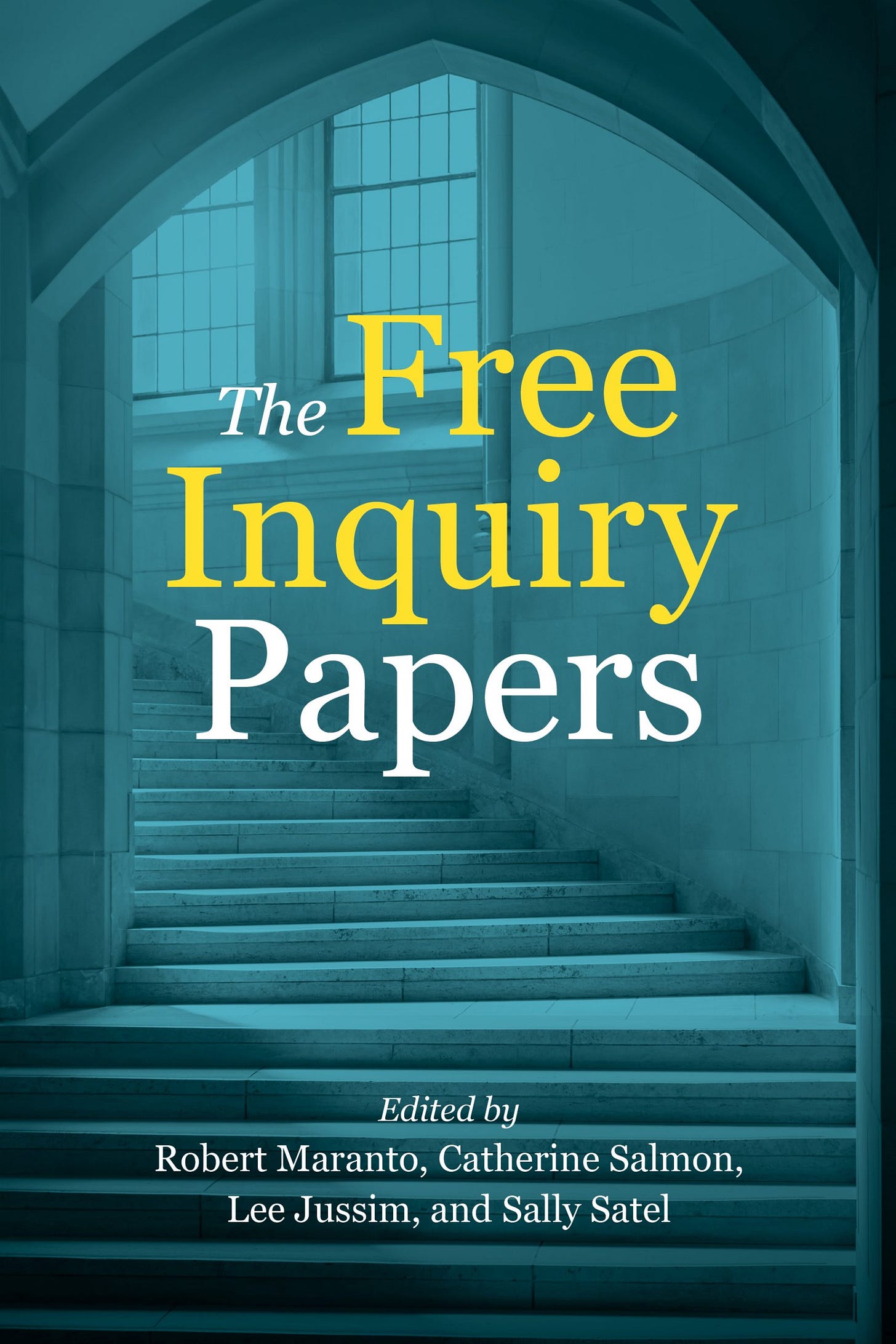Check me and AdGo out in ‘The Free Inquiry Papers,’ available tomorrow!
Current and former FIRE staffers contribute two chapters to this who’s who of academic freedom and campus free speech commentary.
On Tuesday, the American Enterprise Institute will release The Free Inquiry Papers, an edited volume that looks at the ways restraints on free speech have harmed the search for truth in higher education and in research institutions. It’s edited by Robert Maranto, Catherine Salmon, Lee Jussim, and Sally Satel.
My ERI co-conspirator Adam Goldstein and I contributed a chapter. In it, we walk you (the reader) through three days at a fictional university, asking you to put yourself in the shoes of the college president. Then we pose a number of questions, such as How should an administrator react to campus unrest? and How can a college meet its anti-discrimination obligations without resorting to censorship?
We answer that last question in the wake of the December 2023 testimonies by college presidents in front of the House Committee on Education and the Workforce. When then-president of Penn Elizabeth Magill stood up for free speech, for example, she was building her fortress on the shifting sand of her institution’s record on speech controversies. This included but was not limited to the slow-motion witch hunt it used to punish conservative firebrand professor Amy Wax. Like most of the institutions called to account for their hands-off approach on Gaza protests, Penn had to reconcile their consideration of nuance or “context” in anti-Israel chants with their discovery of microaggressions in words like “short-sighted” or “picnic.”
To be clear, it was good that the college presidents finally stood up for free speech culture. But that foxhole conversion should have been accompanied by an acknowledgement that they had done more than most to undermine free speech for the better part of their tenures. That’s what made it the second-best “gotcha” question in history, next to your then-girlfriend asking, “Did you see what the waitress was wearing?”
Adam and I also explain how presidents need to enforce campus rules, and how a consistent failure to do so during the Gaza protests led to fear and chaos. However, we also caution:
Be suspicious of people who want to point to protest as a reason to make radical changes [to campus rules]. For people who want to restrain speech, any incident is adequate justification to propose censorship.
The exercise of free speech emboldens its critics. A protest on campus is an excellent example of this. Those who want to de-prioritize the right of free expression share headlines on social media like so many bloodied shirts, breathless that all of this disturbance could have been avoided—should have been avoided—if only the administration had been enabled to censor the right people at the right times.
Another chapter, contributed by FIRE Chief Research Advisor Sean Stevens and FIRE Research Fellow Nate Honeycutt, along with former FIRE employees Komi Frey and Andrea Honeycutt, introduces the idea of “Ostrich Syndrome.” This refers to the idea that partisan people on campus will tend to ignore evidence that contradicts what they believe about campus free expression.
The chapter breaks Ostrich Syndrome into three distinct stages: “Stage 1 of OS is characterized by ad hominem attacks. In Stage 2, partisans admit there is a problem but claim it has been exaggerated. In Stage 3, they take the problem seriously but raise methodological critiques of how data indicating a problem are collected.” It also makes mention of the Perfect Rhetorical Fortress and Efficient Rhetorical Fortress, which ERI readers and fans of my book with Rikki Schlott, “The Canceling of the American Mind” (out April 29 on paperback!) are well familiar with!
The authors also quantify increased intolerance among both students and faculty using a variety of data, and note the presence of a particular willingness among campus partisans to censor their ideological opponents.
These are but two of twenty chapters in this fantastic tome, which also includes contributions from Jonathan Rauch, Donald Downs, Aaron Saiger, Richard Redding, and more.
From the press release:
The authors represent a range of academic and political backgrounds, but they
share three fundamental perspectives. First, the current higher education regime now
prioritizes activism and status over the search for truth, especially in the social sciences and humanities. This is neither politically nor scientifically sustainable. Second, institutional improvements are possible and would enhance the institutions’ validity and credibility. Third, no one has all the answers.
The erosion of support for free inquiry matters for everyone, but it is especially
dangerous for the institutions whose mission is the production of ideas and knowledge. If we lose our ability to debate and discuss ideas openly and honestly, then science and democracy will yield to a new dark age.
The Free Inquiry Papers is available Tomorrow on Amazon, Barnes & Noble, and bookshop.org. I encourage you to pick up a copy!
SHOT FOR THE ROAD
As you can imagine, I do a lot of interviews. Cable news, radio, podcasts, print journalism … you name the medium, I’ve probably done it, and many times over! So when I say that recording this episode of ‘The Last Meal with Tom Nash’ was one of my absolute favorite interviews in my career, it really means something! Tom is a quadruple amputee, but he’s also a DJ, philosopher, and an incredibly thoughtful and charismatic interviewer. I had a blast sitting down with him (over a delicious sushi meal!) to talk about free speech, cancel culture, and how CBT saved my life. Enjoy (and check out more episodes of his fantastic show here)!



